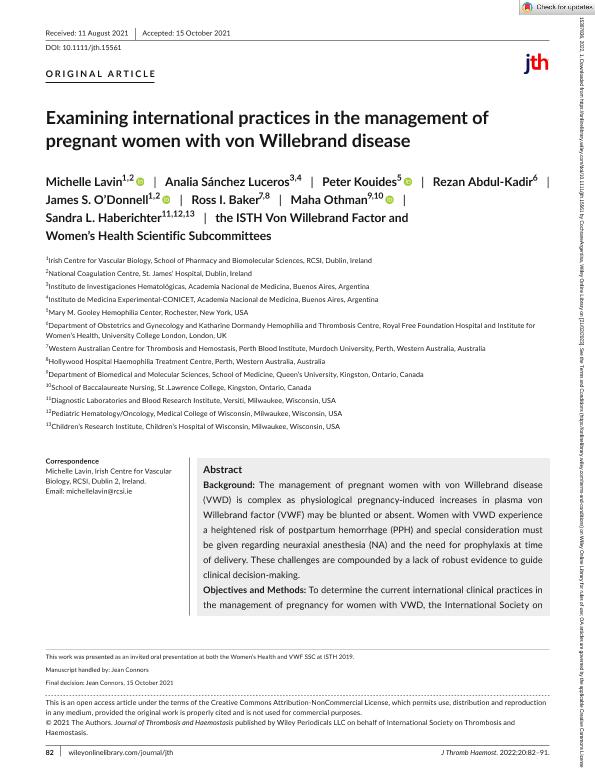Artículo
Examining international practices in the management of pregnant women with von Willebrand disease
Lavin, Michelle; Sánchez Luceros, Analía Gabriela ; Kouides, Peter; Abdul-Kadir, Rezan; O’Donnell, James S.; Baker, Ross I.; Othman, Maha; Haberichter, Sandra L.
; Kouides, Peter; Abdul-Kadir, Rezan; O’Donnell, James S.; Baker, Ross I.; Othman, Maha; Haberichter, Sandra L.
 ; Kouides, Peter; Abdul-Kadir, Rezan; O’Donnell, James S.; Baker, Ross I.; Othman, Maha; Haberichter, Sandra L.
; Kouides, Peter; Abdul-Kadir, Rezan; O’Donnell, James S.; Baker, Ross I.; Othman, Maha; Haberichter, Sandra L.
Fecha de publicación:
01/2022
Editorial:
Wiley Blackwell Publishing, Inc
Revista:
Journal of Thrombosis and Haemostasis
ISSN:
1538-7933
Idioma:
Inglés
Tipo de recurso:
Artículo publicado
Clasificación temática:
Resumen
Background: The management of pregnant women with von Willebrand disease (VWD) is complex as physiological pregnancy-induced increases in plasma von Willebrand factor (VWF) may be blunted or absent. Women with VWD experience a heightened risk of postpartum hemorrhage (PPH) and special consideration must be given regarding neuraxial anesthesia (NA) and the need for prophylaxis at time of delivery. These challenges are compounded by a lack of robust evidence to guide clinical decision-making. Objectives and Methods: To determine the current international clinical practices in the management of pregnancy for women with VWD, the International Society on Thrombosis and Haemostasis (ISTH) conducted an international survey of health-care providers (HCP). Results: One hundred thirty-two respondents from 39 countries were included in the final analysis. Variations in clinical practice were identified in antenatal (monitoring of plasma VWF and ferritin levels), peripartum (optimal plasma VWF target at delivery) and postpartum management (definitions used for PPH and postpartum monitoring). A key area of divergence was suitability for NA for women with type 2 and type 3 VWD, with many respondents advising against the use of NA even with VWF supplementation (29% type 2 VWD, 37% type 3 VWD) but others advising use once plasma VWF activity was >50 IU/dL (57% type 2 VWD; 50% type 3 VWD). Conclusions: This survey highlighted areas of uncertainty surrounding common management issues for pregnant women with VWD. These data underscore the need for international collaborative research efforts focused on peripartum management to improve care for pregnant women with VWD.
Palabras clave:
ANESTHESIA
,
POSTPARTUM
,
PREGNANCY
,
VON WILLEBRAND DISEASE
,
VON WILLEBRAND FACTOR
Archivos asociados
Licencia
Identificadores
Colecciones
Articulos(IMEX)
Articulos de INST.DE MEDICINA EXPERIMENTAL
Articulos de INST.DE MEDICINA EXPERIMENTAL
Citación
Lavin, Michelle; Sánchez Luceros, Analía Gabriela; Kouides, Peter; Abdul-Kadir, Rezan; O’Donnell, James S.; et al.; Examining international practices in the management of pregnant women with von Willebrand disease; Wiley Blackwell Publishing, Inc; Journal of Thrombosis and Haemostasis; 20; 1; 1-2022; 82-91
Compartir
Altmétricas



